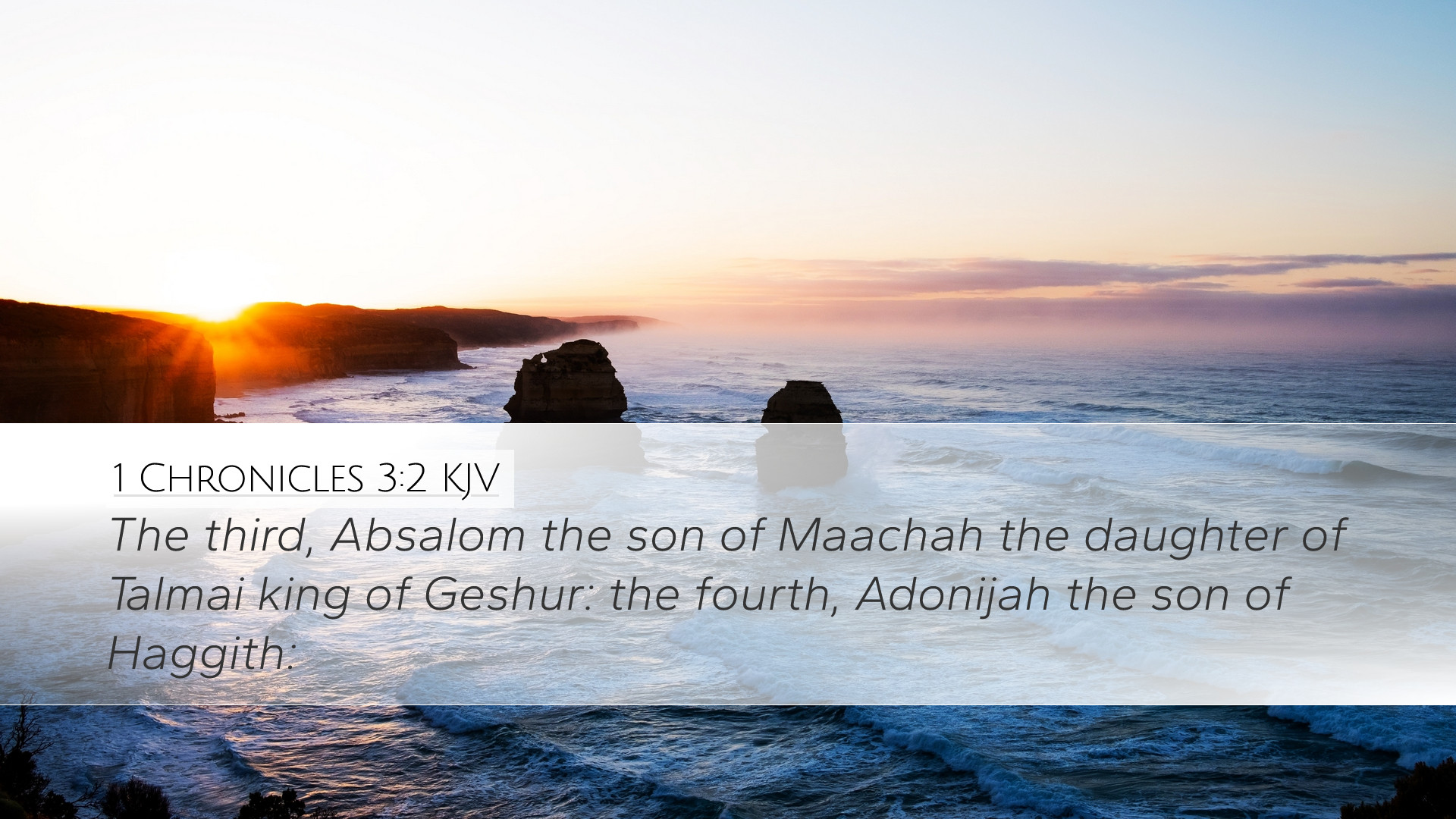Commentary on 1 Chronicles 3:2
Bible Verse: 1 Chronicles 3:2 - "The second was Daniel, the third was Abihud."
Introduction
The genealogical records in 1 Chronicles provide insight into the lineage of David, emphasizing the theological significance of David's descendants in the redemptive history of Israel. In 1 Chronicles 3:2, the mention of Daniel and Abihud as descendants of David serves a dual purpose: to establish the continuity of kingly lineage and to highlight the roles each descendant played in God’s unfolding plan.
Contextual Background
The book of Chronicles is uniquely focused on the history of Israel, detailing the Davidic line and highlighting the temple worship prevalent during its compilation. This segment falls within a larger genealogy of David’s sons, which underlines the transition from the monarchy to the post-exilic period. Such genealogies speak to the covenant promises God made to David, as well as His faithfulness to Israel despite their ups and downs.
Genealogical Importance
As we explore 1 Chronicles 3:2, the genealogies offer lessons on God's faithfulness across generations. Matthew Henry notes the importance of such accounts in recognizing the promised lineage, establishing a context for the Messiah’s arrival, and affirming God’s covenant with David. This particular verse creates a bridge connecting the past to God’s redemptive works in the present and future.
Name Significance
- Daniel: Meaning "God is my judge," the name invokes themes of divine providence and authority. It serves as a reminder that ultimate judgment lies with God. This framing invites readers to consider the role of justice in the lineage of David.
- Abihud: His name translates as "the father of majesty." Albert Barnes emphasizes that such names carry an implication of the characteristics that these descendants were expected to embody. This hints at the dignity associated with David's lineage.
Theological Insights
The genealogical accounts in Chronicles are not merely historical records; they are infused with profound theological implications. Adam Clarke suggests that each name mentioned in the genealogies calls our attention to God’s sovereignty and His plan throughout history. The lineage is a testament to how God fulfills His promises over time, showcasing that even in a nation's decline, there remain faithful remnants through the line of David.
Lessons on Leadership
The continuation of the Davidic line to Daniel and Abihud offers profound lessons on leadership and legacy. Leaders are not only remembered for their deeds but also for their descendants. The emphasis on Daniel’s and Abihud’s names pushes readers, particularly pastors and theologians, to reflect on how their lives impact those who follow. The legacy of faithfulness to God's covenant is vital for future generations.
God's Faithfulness
The recording of these names reminds believers of God’s unfaltering commitment to His people. Matthew Henry asserts that despite human failures, God’s plans endure. Even in difficult times, like the exilic period that follows, these genealogies provide hope that God’s promises are steadfast. Pastors can draw upon this to encourage their congregations during trials, reminding them that God’s faithfulness transcends circumstances.
Conclusion
In summary, 1 Chronicles 3:2 presents much more than the mere lineage of David; it encapsulates God’s overarching narrative of grace, justice, and faithfulness. Students and scholars of Scripture will find rich territory in these names which reflect deeper truths about God's character and His redemptive plans for humanity. Whether revered as a historical document or a theological treatise, the significance of these genealogical records fuels the faith of believers, reinforcing the message that God is actively involved in the lives of His people through all time.
Reflection Questions
- How can the understanding of lineage and names inform our comprehension of God's providence in our own lives?
- What does the legacy left by our forebears mean for our current faith journey?
- How can we manifest qualities of integrity and righteousness exemplified by figures in our spiritual lineage today?


